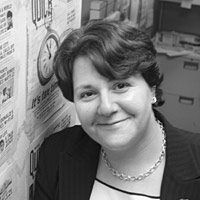| |
 |
| |
Laura Gordon
'90 |
Alumni
Profile: Laura Gordon '90
Quick
study
Despite
little previous newspaper experience, Laura Gordon '90 has
spearheaded the launch of a successful youth-oriented daily
paper in Dallas
By
Ed Finkel
For three
decades, newspapers have experienced a declining readership
among young people. Scarborough Research, which measures lifestyle
and demographic attributes of American consumers, reported
in 1967 that 73 percent of 25- to 34-year-olds regularly read
a newspaper. By 2001, that number had fallen to 40 percent.
Enter
a wave of free tabloid papers, many of them owned by flagship
dailies, handed out to commuters in cities around the world.
Easy to read on a train or bus, and packed with bits of information
and colorful graphics, some see these publications as a way
to entice younger readers back to newspaper reading.
Among
those helping to establish this new model for print media
is Kellogg School alum Laura Gordon '90, who had less than
two weeks to prepare for her role as publisher of Quick,
a sister publication to the Dallas Morning News.
Gordon
had spent plenty of time focusing on 18- to 34-year-old readers
in her position as managing director of new product development
at the Morning News, and she had a wealth of experience
in understanding customer’s needs through earlier brand
management, marketing and product development work at Helene
Curtis.
But little
could have prepared her for the 12-day launch of the aptly
named Quick, put on the fast track when the Morning News
learned in October 2003 that a competitor had plans to launch
a similar product.
“We
decided there was a first-mover advantage and we needed to
enter the market quickly,” says Gordon.
“Those
were crazy days. We were housed in the basement with no windows.
We told nobody else this was going on. When people were told
to report to duty [at Quick] and disappeared from their
[Morning News] jobs, people just covered them, and
no one knew why.”
Gordon
and her new staff, who she was asked to lead for an indeterminate
period, had to work out the publication’s design and
all the back-end processes.
“There
was an amazing exhilaration to watch the publication come
off the presses for the first time,” says Gordon, whose
“quick” work was rewarded in an Oct. 1 promotion
to senior vice president of marketing for the Morning News.
In the
weeks that followed, Gordon needed to earn the respect of
the journalists working on the publication.
“It
was an unusual opportunity to step into this role with no
prior newspaper experience,” she says. “It was
about building and leveraging relationships throughout the
Dallas Morning News to help myself learn quickly.”
Although
Quick bears some resemblance to the Morning News,
its mix appears decidedly different. Four paragraphs often
suffice as coverage even for complex stories, while the parent
paper dedicates much more ink to reporting.
“To
attract young people, papers are going to have to fit our
lifestyle,” Gordon explains. “Breakfast as our
parents knew it, where you sit down with orange juice and
pancakes, doesn’t exist anymore. Papers are read in
between things, are portable and contain a balance of news
and entertainment.”
That means
Quick readers do not receive the same depth of coverage,
she acknowledges. “We feel like we are getting the most
important part of the story, but never claim to be the full
story,” she says. “We try to do a good job of
telling people that there is more to learn and that this can
be found in the Dallas Morning News.”
While
some young people will want the full story, “Those people
are not going to be Quick readers,” Gordon says.
As for
the future of newsprint, Gordon says papers will have to continue
leveraging innovative strategies to gain readers.
“What
these products show is that the one-size-fits-all strategy
is probably not going to be effective,” she predicts. |





